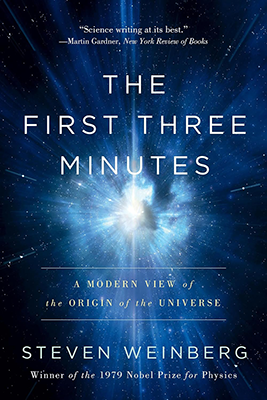The First Three Minutes
“The First Three Minutes: A Modern View of the Origin of the Universe” by Steven Weinberg is a classic work in cosmology that explores the early moments of the universe’s existence and the processes that led to its formation. Here’s a summary:
Introduction to Cosmology: Weinberg introduces the field of cosmology, the scientific study of the origin, evolution, and structure of the universe. He discusses the Big Bang theory, which posits that the universe began as a hot, dense state and has been expanding and cooling ever since.
The Early Universe: Weinberg explores the first moments of the universe’s existence, known as the “first three minutes.” He discusses the processes that occurred during this time, including nucleosynthesis, the formation of light elements such as hydrogen, helium, and lithium, and the production of photons and neutrinos.
The Cosmic Microwave Background: Weinberg discusses the discovery of the cosmic microwave background radiation, which is the afterglow of the Big Bang. He explains how observations of this radiation have provided crucial evidence for the Big Bang theory and have helped to constrain models of the early universe.
The Inflationary Universe: Weinberg explores the concept of cosmic inflation, a brief period of exponential expansion that occurred in the early universe. He discusses how inflation can explain several puzzles in cosmology, such as the uniformity of the cosmic microwave background and the large-scale structure of the universe.
Particle Physics and Cosmology: Weinberg discusses the connections between particle physics and cosmology, exploring how the properties of elementary particles and the forces that govern them have influenced the evolution of the universe. He discusses topics such as the Higgs boson, dark matter, and dark energy, and their implications for cosmology.
The Anthropic Principle: Weinberg explores the anthropic principle, which suggests that the properties of the universe are finely tuned to allow for the existence of life. He discusses the implications of the anthropic principle for our understanding of the universe and the nature of reality.
The Future of Cosmology: Weinberg reflects on the future of cosmology and the challenges that lie ahead in our quest to understand the universe. He discusses the role of new observational techniques, such as gravitational wave detectors and space telescopes, in advancing our understanding of the cosmos.
Overall, “The First Three Minutes” offers a fascinating and accessible overview of the origin and evolution of the universe. Weinberg’s clear and engaging writing style, coupled with his deep understanding of cosmology, makes the book a must-read for anyone interested in the big questions of modern physics and astronomy.

